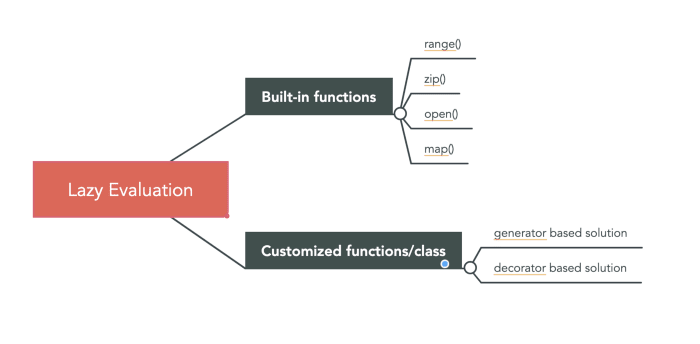Iterables and Generators
A key concept that is introduced when discussing the creation of "generators" is using for and in to iterate over generators (like lists), but lazily on demand. This is formally called lazy evaluation or 'call-by-need' which delays the evaluation of an expression until the value is needed. We can think of this as a form of optimization - avoiding repeating function calls when not needed.
Here's a graphic borrowed from Xiaoxu Gao, check out her post here:
We'll create some generators (customized function/class), but bear in mind that it will be redundant with range(), both of which illustrate lazy evaluation.
# Example 1: create natural_numbers() function that incrementally counts numbers
def natural_numbers():
"""returns 1, 2, 3, ..."""
n = 1
while True:
yield n
n += 1
# check it's type
type(natural_numbers()) # generator
# call it, you get: <generator object natural_numbers at 0x7fb4d787b2e0>
natural_numbers()
# the point of lazy evaluation is that it won't do anything
# until you iterate over it (but avoid infinite loop with logic breaks)
for i in natural_numbers():
print(i)
if i == 37:
break
print("exit loop")
# result 1...37 exit loop
Here's another example using range, a built-in python function that also uses lazy evaluation. Even when you call this generator, it won't do anything until you iterate over it.
evens_below_30 = (i for i in range(30) if i % 2 == 0)
# check its type - generator
type(evens_below_30)
# call it, you get: <generator object <genexpr> at 0x7fb4d70ef580>
# calling it does nothing
evens_below_30
# now iterate over it with for and in - now it does something
# prints: 0, 2, 4, 6 ... 28
for i in evens_below_30:
print(i)
Finally, this section brings up another important key word enumerate for when we want to iterate over a generator or list and get both values and indices:
# create list of names
names = ['Alice', 'Lebron', 'Kobe', 'Bob', 'Charles', 'Shaq', 'Kenny']
# Pythonic way
for i, name in enumerate(names):
print(f"index: {i}, name: {name}")
# NOT pythonic
for i in range(len(names)):
print(f"index: {i}, name: {names[i]}")
# Also NOT pythonic
i = 0
for name in names:
print(f"index {i} is {names[i]}")
i += 1
In my view, the pythonic way is much more readable here.




Top comments (0)